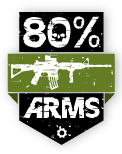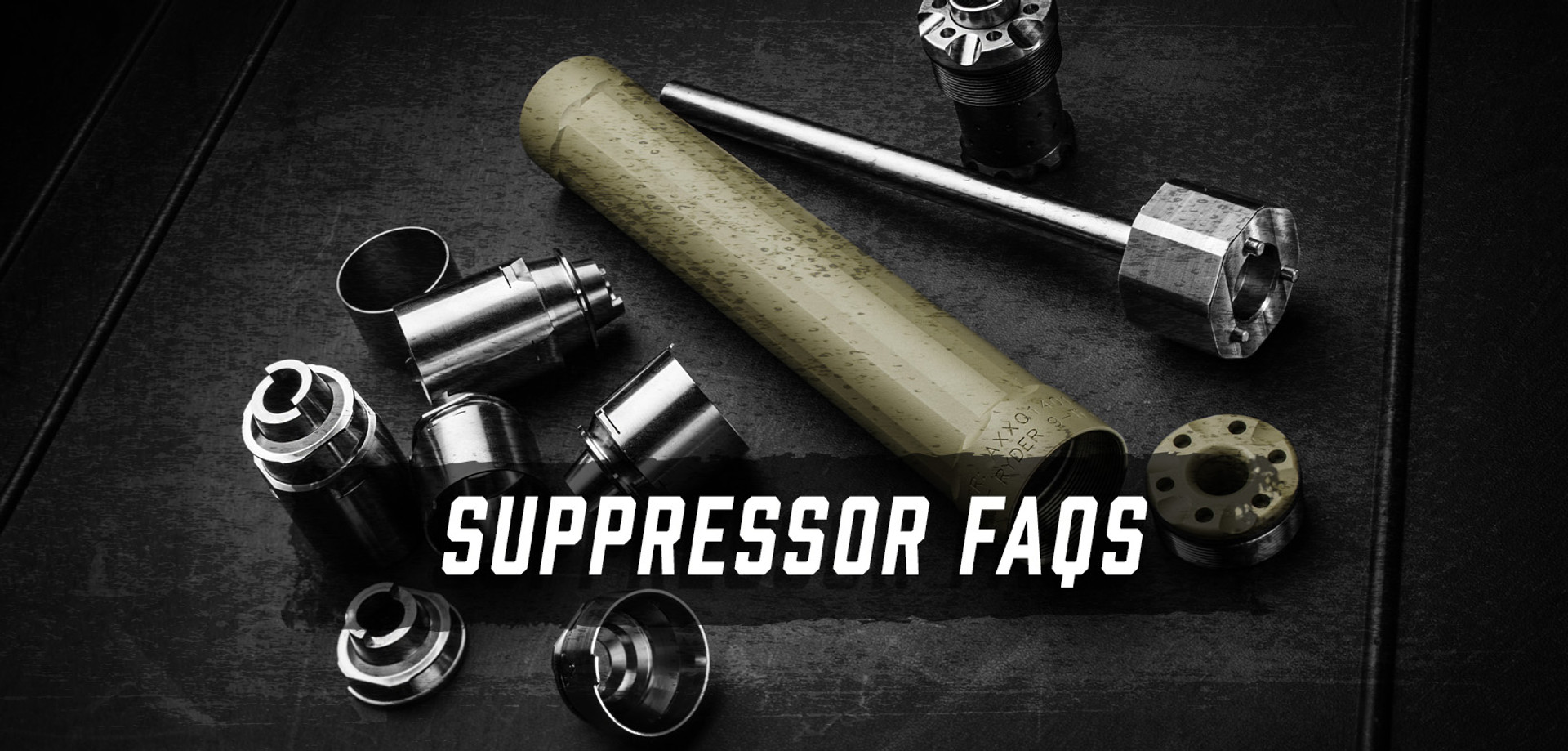FAQ: Silencer vs Suppressor - Which one is correct?
Two nearly undetectable, whistles happen, no other sound. Our operator slides back into the darkness. How could our super-secret ninja operator have done this? The answer, at least in the world of Hollywood, politicians, and our beloved ATF, is the humble suppressor.
While they might not work quite as well in reality as they do in a James Bond flick, there are many benefits of utilizing these devices for the everyday gun owner. Read on to learn a little bit about these devices!
HISTORY OF THE SUPPRESSOR
Original Sales Brochure from 1909. Photo Source: Forgotten Weapons
The first commercially available suppressor that actually worked was invented by Hiram Maxim in 1902. Fun fact, his dad invented the first portable and fully automatic machine gun (also known as The Maxim Gun).
This image depicts Hiram Maxim with the "Maxim Gun." We doubt ol’ Hiram had any idea of where this idea would go in terms of “portability." Photo Source: Spiegel.de
THE MAXIM SILENCER
Patented in 1909 was a device attached to a barrel that reduced noise and muzzle flash. You could order a suppressor from a mail-order catalog at this point, crazy right? The entire point was simply to reduce noise pollution and hearing loss, using similar technology being used for car engines.
Maxim referred to this product as a “silencer”, much to the chagrin of forum and YouTube experts everywhere, who would like to inform you it is actually a “suppressor.” Don’t really care what it is called? Over the history brief? Me too, let’s talk about how these things work!
Original Sales Brochures and Patent from 1909. Photo Source: Forgotten Weapons
Original Patent Diagram from 1909. Photo Source: Forgotten Weapons
HOW QUIET IS A SUPPRESSOR ACTUALLY?
Most suppressors typically reduce less than 40 decibels, with the average around 30-35 decibels. Put this into perspective; this is about the difference in decibel level between a professional football stadium at full volume reduced the sound of your average lawnmower’s decibel rating.
Pretty wild right? You'll still have a pretty loud noise, but it will be far more manageable and much safer for your hearing! For your firearm, this means once the gas does exit the suppressor, it is moving slower, with less pressure, meaning it is quieter. What you are hearing when you fire a weapon are two things, a bullet becoming supersonic is one.
Supersonic speed is defined as, “The speed of an object that exceeds the speed of sound”. That's basically any round with a velocity above 1,000 feet per second.
When a shot is fired, what you're hearing are three main things:
- The sound of combustion as the primer ignites a round's gunpowder.
- The sound of the bullet exiting the barrel going supersonic/or subsonic.
- Bonus: the sound of your pistol slide or rifle BCG cycling back and forth.
For those of us that are not Sheldon Cooper or other esteemed physicists, it's when “gun go bang”.
SILENCER VS SUPPRESSOR - WHAT’S THE DIFFERENCE?
According to Hiram’s actual patent, the difference is truly just the term you choose to use. Even though it was originally called a “silencer” it actually suppresses the sound, not completely silence it. Whichever term you choose to use, it’s the same device at the end of the day!
HOW DOES A SUPPRESSOR WORK?
To put it simply, a suppressor is a muffler for your weapon, and it basically works very similarly to the muffler on your car, (as long as you don’t have a Fast and the Furious muffler on your 4-banger, that would be the opposite, but I digress).
Modern suppressors, to summarize it succinctly, use a series of internal baffles to disrupt all the fast-moving, flaming hot gasses expelled from the muzzle of the weapon as it is fired. As the gas travels through the baffles, they are slowed and cooled in a similar way as the muffler on your car works.

Suppressed Glocks. Photo Source: Lynx Defense
WHY WOULD I WANT TO USE A SUPPRESSOR?
There are many reasons to use a suppressor — mainly, to protect your hearing. Most suppressors reduce sound by around 35 decibels. This reduces the sound of gunfire enough to not jeopardize your hearing when shooting without hearing protection.
Remember, these are muffling the report of the sigweapon, they are not silencing it completely. John Wick 2 and the silencer battle scene? Two lethal assassins having a gunfight with suppressors walking around public transportation amongst unsuspecting people going about their lives...
It pains me to inform you, but movies aren’t real and that ain’t happening Mr. Wick! Is it worth buying a suppressor? We sure think so, but ultimately, that's up to you!
An unrealistic representation of a "silenced" pistol fight in John Wick: Chapter 2, filmed inside the PATH West Concourse at the One World Trade Center Station. Photo Source: Robot Ninja Pirate - YouTube
DO SUPPRESSORS REDUCE RECOIL?
No, they do not. In fact, suppressors increase back pressure. Depending on your rifle setup you may experience more hot gas in the face, which is unpleasant, but can be mitigated with parts and tuning.
DO SUPPRESSORS AFFECT VELOCITY OR RANGE?
One common myth is that suppressors reduce velocity. Don’t believe everything you read on the internet or what you see in video games. The reality is suppressors, in every test we can find, had no effect on muzzle velocity at all!
Sometimes myths are actually rooted in fact. Older suppressors did have a rubber gasket or “wipe” at the end of the can that would contact the round and slow it down. The idea was that the wipe would hold gas in longer, to make the shot quieter.
Extra friction really did slow the bullet down. The problem with wipes was that the rubber or plastic discs would degrade over time. But as suppressor technology developed, metal baffles served to replace that design.
Modern silencers are machined to a degree that there is just enough space between the bullet and the baffles for clearance. With no friction, there's also no change to velocity or your effective range.

Suppressor on an AR-15. Photo Source: Sofrep
HOW HOT CAN SUPPRESSORS GET?
Enough to cook raw bacon to a crisp. Hot enough for you? This is why suppressor covers are great. They'll protect you from getting burned and reduce the heat signature that shooting your can gives off.
There is the argument that suppressor covers can cause more wear on a silencer's internals being tortured by the high temperature. This may be true for full auto users but for most civilians - it's a nonissue.
HOW LONG DO SUPPRESSORS LAST?
Taking care of your suppressors, as with any tool, is essential to their longevity. Always double check you installed your suppressor correctly to avoid baffle strikes. (When the bullet strikes the baffles inside the suppressor).
Always shoot ammunition that your suppressor is properly rated to use and clean your suppressor regularly.
Following these simple steps will ensure your can will be around for generations! Or just buy a SureFire suppressor like the RC2. According to GarandThumb the RC2 can last over 80,000 rounds.
WHICH SUPPRESSOR SHOULD I GET?
There are a lot of great cans out there. If you're planning on having a suppressed rifle, we think multi-caliber suppressors are the best.
Say you bought a .30 caliber can like the Surefire RC2 (but for 7.62) you'd then be able to shoot .308 Winchester, .30-06 Springfield, .300 Blackout, 7.62x51 NATO, 7.62x39, 5.56 NATO, .223 Remington, and .22LR through it (JUST TO NAME A FEW).
It might not be a perfect fit with every firearm you own in terms of looks or weight balance but hey, you'd definitely save a pretty penny on not needing to purchase as many tax stamps.
BUILD YOUR NEXT SUPPRESSED AR15 WITH 80% PERCENT ARMS!
Hearing damage is not cool. The United States is one of the few countries in the world that allows for civilian ownership and recreational use of suppressors. The ATF may be a huge pain to deal with it but we highly recommend suppressor ownership for those that live in free states.
Are you ready to build your next suppressed setup? We have everything you need to build a functional and ultra-reliable rifle from our 80% lower receivers to additional accessories you will need!



 Back to List
Back to List